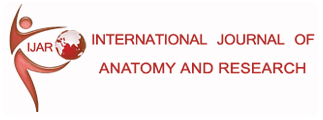IJAR.2018.428
Type of Article: Original
Volume 7; Issue 1.2 (February 2019)
Page No.: 6166-6170
DOI: https://dx.doi.org/10.16965/ijar.2018.428
KARYOTYPE ANALYSIS IN CASES OF PRIMARY MALE INFERTILITY
Bhavin B. Kodiyatar 1, Brijesh M. Patel *2, Viren B. Kariya 3.
1 Assistant Professor, Anatomy Department, B.J. Medical College, Ahmedabad, Gujarat, India.
*2 Assistant Professor, Anatomy Department, B.J. Medical College, Ahmedabad, Gujarat, India.
3 Associate Professor, PDU Medical College, Rajkot, Gujarat, India.
Corresponding Author: Dr.Brijesh M. Patel, 01, Riddhi Siddhi tenamnets, Near Bhavana raw house society, Ranip, Ahmedabad, Gujarat-382480, India. Mobile: 07984682125 E-Mail: brijpatelbjmc@gmail.com
ABSTRACT:
Introduction: Infertility is a major health problem in 10-15% Indian couples affecting their psychological and social wellbeing. There is increasing recognition to the contribution of genetic abnormalities to the causation of male infertility. Genetics play a important role in infertility by controlling the physiological processes including hormonal factors, spermatogenesis, and sperm quality. The aim of the study was to find out the Chromosomal abnormalities that play a major role in male infertility cases with non-obstructive azoospermia and oligospermia. The timely investigation to detect genetic abnormality gives better understanding about prognosis to the patients and helps in providing genetic counseling with early intervention, management and also understanding risks involved in transmission of abnormality to future generations.
Materials and methods: In present study total 30 male cases of primary infertility clinically diagnosed and conformed by semen analysis as unobstructed azoospermia and oligospermia were selected. Their karyotypes were prepared and studied for chromosomal abnormalities
Result: The Numerical chromosomal abnormality was found in 2 (6.66%) cases of azoospermic group in the form of Klinefelter syndrome (47,XXY). In cases of oligospermia 1 (3.34%) case had an abnormality in the form of Robertsonian translocation involving 14:15 chromosome. The total 3 cases (10%) were found to have gross chromosomal abnormality by conventional cytogenetic method.
Conclusion: In cases of Klinelfelter syndrome (47,XXY) due to altered karyotype or due to meiotic non-disjunction, the residual gametes may be extracted through Testicular / Epididymal Sperm Aspiration (TESA). It is necessary that the diagnosis be made as soon as possible, so as to guarantee the cryopreservation of the semen before complete infertility sets in.
Key words: Infertility, Karyotypes, Klinefelter syndrome, Azoospermia, Oligospermia.
REFERENCES
- [World Health Organization (WHO) and International Committee for Monitoring Assisted Reproductive Technology (ICMART). The revised glossary of ART terminology; 2009:07-09.
- Krausz C, Forti G. Clinical aspects of male infertility. 5thBerlin: Springer-Verlage; 2009:103-109.
- Kretser DM, Burger HG, Fortune D. Hormonal, histological and genetic studies on male infertility. J Clin Metab.1972;35:392-401.
- Delvaux T, Nostlinger C.Reproductive choice for women and men living with HIV.Reprod Health Matters.2007;15:46–66.
- Bhasin S, De Kretser DM, Baker HW. Clinical review. Pathophysiology and natural history of male infertility. J Clin Endocrinol Metab. 1994;79:25-29.
- Shamshi MB, Kumar K, Dada R.Genetic and epigenetic factors:Role in male infertility.IJOU.2011;27(1):110-120.
- Hucklenbroich K, Gromoll J, Heinrich M, Hohoff C.Partial deletions in the AZFc region of the Y chromosome occur in men with impaired as well as normal spermatogenesis.Hum Reprod.2005;20:191-197.
- Ceylan GG, Ceylan C, Elyas H.Genetic anomalies in patient with severe ooligozoospermia and azoospermia.GMR.2009;8(3):915-922.
- Rooney DE,Czepulkowski Bh.Human cytogenetics:A practical approach.2nd edition. volume I and II. Oxford:IRL Press;1992:167-173.
- Nagvenkar P,Desai K,Hinduja I,Zaveri K.Chromosomal studies in infertile men with oligozoospermia and non-obstructive azoospermia.Indian J Med Res.2005;122:34-42.
- MT Akbari, Behjati F, Pourmand Cytogenetic abnormalities in 222 infertile men with azoospermia and oligospermia in Iran: Report and review. Ind Jour of Gen.2012;18:198-203.
- Speroff l, Fritz MA. Clinical Gynecology Endocrinology and Infertility.7thLippincott Williams and Wilkins; 2004:209-215.
- Gupta A. Cytogenetic analysis in primary male infertility. J Obstet Gynecol india.2009; 59:340-343.
- Akgul M, Ozkinay F, Ercal D, Cogalu O. Cytogenetic abnormalities in 179 cases with male infertility in western region of Turkey. J Asst Reprod Genet.2009; 26: 119-122.
- Tiepoli L, Zuffardi O. Localization of factors controlling spermatogenesis in the nonfluorescent portion of the human Y chromosome long arm. Hum Genet.1976;28:119-124.
- Addy MJ, Silber SJ, Gosden RG. Intra-cytoplasmic sperm injection and infertility. Nat Genet; 29:131-137.
- Rolf C, Gromoll J, Simoni M, Nieschlag E. Natural transmission of a partial AZFb deletion of the Y chromosome over three generations: case report. Hum Reprod; 17: 2267-2271.








